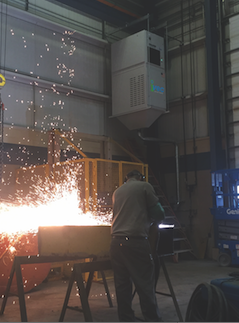On-Demand Filtration System Lowers Energy Consumption
IVEC’s fully automated Ultra ventilation system adjusts fan speed based on changes in velocity and/or air pressure. In addition to saving energy and extending filter life, maintaining air flow regardless of conditions ensures continuous particulate removal and lowers maintenance requirements.
Posted: February 25, 2020
The Ultra on-demand ventilation system from IVEC (New Berlin, WI) automatically adjusts power usage and fan speeds based on demand and filter conditions. In addition to lowering energy costs, this lowers total cost of ownership by extending filter life.
A key system component is the general ventilation self-cleaning (GVSC) dust collector, a non-ducted, self-contained ambient air-filtration unit designed for easy, versatile configuration above the work zone. Special sensors automatically modulate fan speed based on changes in velocity and/or air pressure. When pressure on the filter goes higher, for example, the fan speeds up, effectively maintaining a consistent air flow to save horsepower and filter life.
The system allows operators to set limits on how dirty filters can get before they go into an automated cleaning cycle. When the system senses the filter has reached the designated threshold, it takes the unit offline to begin pulling particulate from the collection to the Gatekeeper Sweeper, the centralized housekeeping unit that collects particulate from all units in one convenient location. In addition to lowering maintenance time, this feature protects maintenance teams from exposure to harmful contaminants because they cap one drum instead of dumping multiple drawers at several locations.
Technology that allows for sequential cleaning of the units ensures there’s never more than one unit offline at a time. The units can be pre-programmed to avoid shutting down during peak production times.
“When the filter’s clean, the fan doesn’t need to run as hard,” says President and COO Kevin Rohde. “This saves 40% to 60% on energy compared with a static system in which the fan runs at full horsepower all the time. One client received a competitive bid indicating it would take 1900 hp to accomplish what our 350 hp system does.”
Multiple units may be installed across the room from one another, working in tandem to create a desired air flow pattern even in larger areas. Thanks to the smart technology, the units communicate with each other to throw air across work areas to direct particulate to receiving collectors, thereby capturing more pollution.
“Our smart system is the only one to keep airflow constant regardless of conditions,” says Rohde. “It measures all conditions to see what’s causing resistance to the fans and then speeds up the fan until the correct air flow is reached. Thanks to the self-cleaning mechanism, we’re also able to extend the life of the filters as much as 200%. Additional savings are realized because ductwork doesn’t need to be installed.”
Other features include Command intelligent software that monitors system performance remotely via a cell phone or PC. Maintenance teams can access the system offsite from anywhere in the world and receive directions on how to correct any issues. In addition, the software quantifies energy savings so factories may qualify for larger government rebates due to decreased energy consumption. IVEC has helped three clients receive grants in excess of $500,000 each.
IVEC Systems LLC, 17750 W Liberty Lane, New Berlin, WI 53146-2144, 866-670-4832, fax: 800-260-9199, www.ivecsystems.com.















